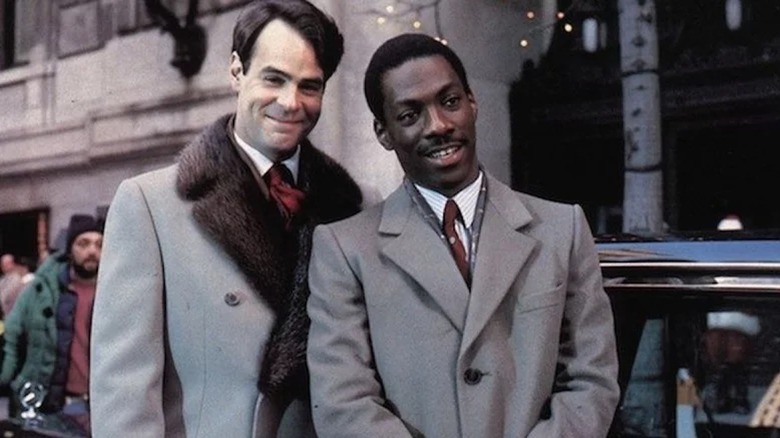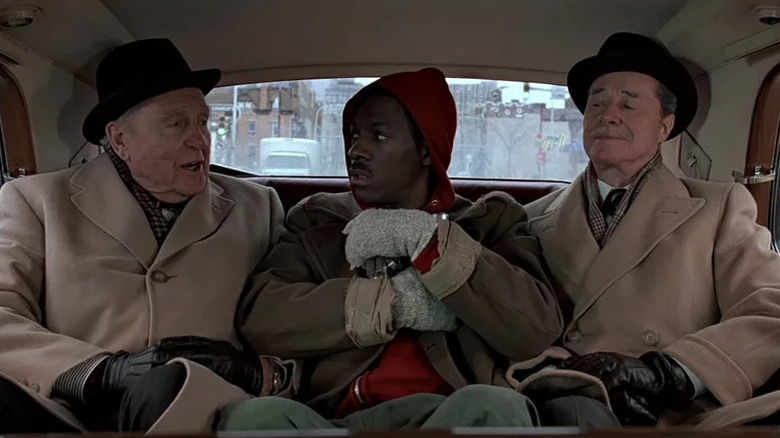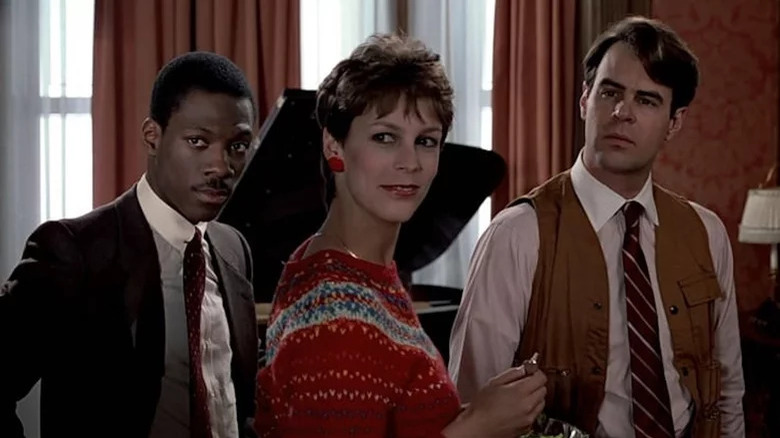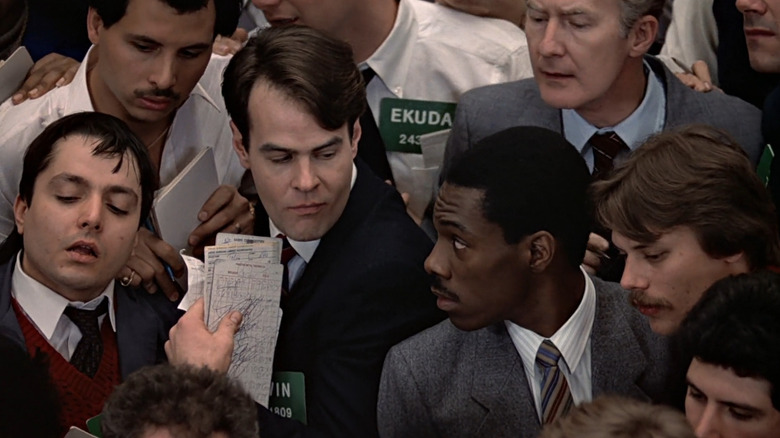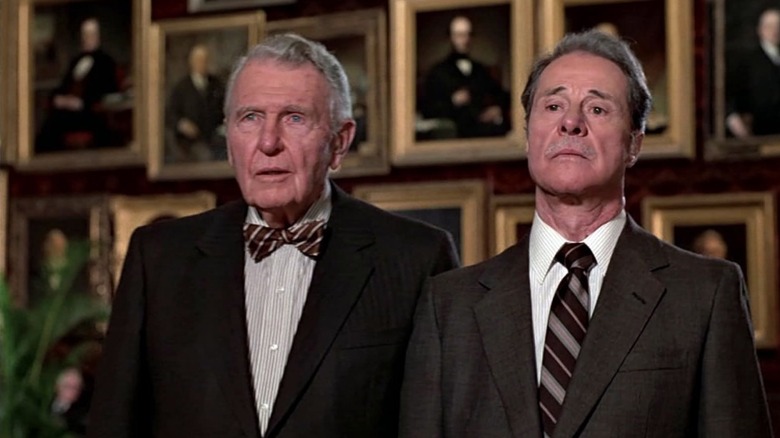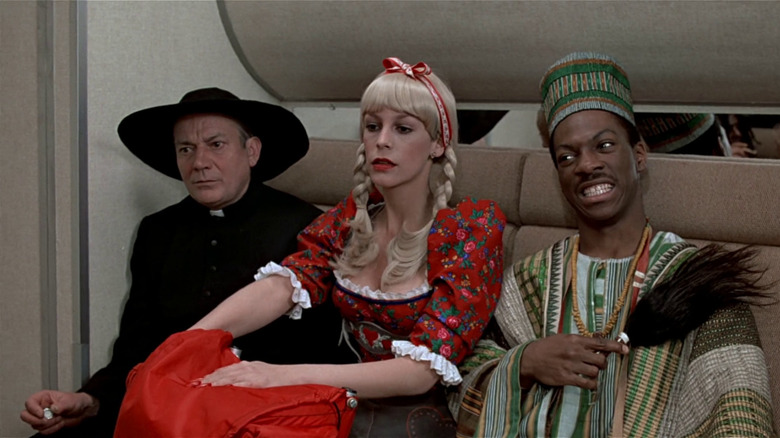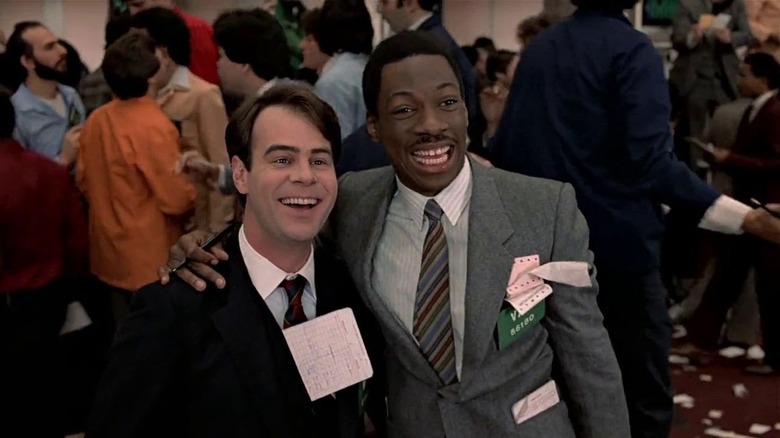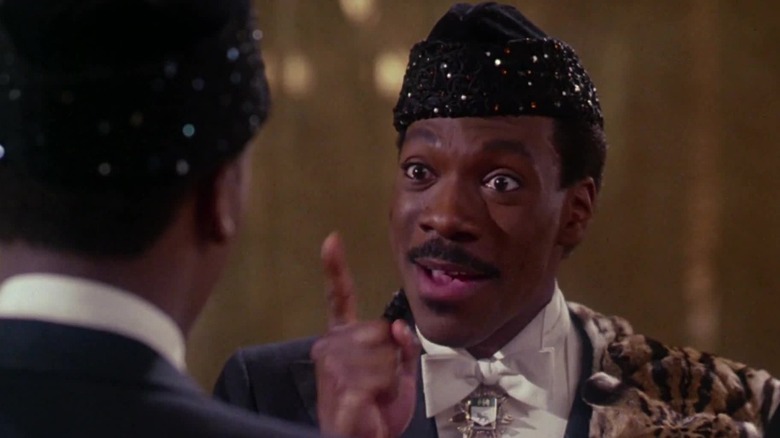Trading Places Ending Explained: Buy High, Sell Low
Wall Street is an absurd place. When you get down to it, the financial markets are just groups of people playing a really, really expensive game. And yet, there aren't that many movies or TV shows that capitalize on the inherent farcicality of this wild world. Usually, it's all serious business, as in "Succession" or "Billions." If you're looking for something that highlights finance's sheer silliness, you have to go all the way back to the "greed is good" era.
John Landis' 1983 film "Trading Places" takes a satirical look at the commodities market and the people who invest in it. Two rich commodity traders, the Dukes, become bored with their charmed existence and make a bet to spice things up. The older Duke thinks that anyone could do their jobs under the right circumstances, so he fires his right-hand man and hires a struggling street hustler instead. When the two victims realize they've been duped by the Dukes, they hatch a plot to swindle the brothers out of their millions.
For a lighthearted comedy, the plot of "Trading Places" is more complicated than you might expect. From the 1980s-style racism to the arguments about biological essentialism to what actually happens on the market floor, there's a lot to unpack here. If you're still a little confused about how these characters get from point A to point B, we've got you covered. Keep reading for a deep dive into the high-stakes ending of "Trading Places."
What you need to remember about the plot of Trading Places
The central theme of "Trading Places" is the question of nature versus nurture. Businessmen Mortimer (Don Ameche) and Randolph Duke (Ralph Bellamy), who run Duke & Duke Commodity Brokers in Philadelphia, come down on different sides of the issue. Randolph believes that one's lot in life is the result of environmental factors, while Mortimer thinks it's all about "breeding." So, the brothers decide to put their ongoing debate to the test. They fire their general manager, Louis Winthorpe III (Dan Aykroyd), a Harvard-educated man who exemplifies Mortimer's concept of good stock, and replace him with Billy Ray Valentine (Eddie Murphy), a hustler who lives on the streets.
To complete the experiment, the Dukes ruin Winthorpe's life by framing him for crimes he didn't commit and making his fiancée leave him, then give Valentine everything he needs to succeed, including Winthrope's house and his butler, Coleman (Denholm Elliott). Valentine enjoys his newfound life of luxury but is ultimately unfulfilled. Meanwhile, Winthorpe meets a sex worker named Ophelia (Jamie Lee Curtis) who helps get him back on his feet. Eventually, Valentine discovers that he's part of this perverse experiment and teams up with Winthorpe to take the Dukes down. Ophelia and Coleman join the enterprise as well, hoping to reap the financial rewards.
What happened at the end of Trading Places?
Winthorpe and Valentine's plan to defeat the Dukes rests on the humblest of commodities: frozen orange juice. They discover that the Dukes have covertly hired a man named Beeks (Paul Gleason) to steal a USDA report on orange crop forecasts, and intend to corner the market — meaning they're going to buy enough shares to control the price — using this insider info.
The first step in Valentine and Winthorpe's scheme involves stealing the report from Beeks. To do so, they concoct a hair-brained scenario involving several ill-conceived disguises. Valentine dresses as an exchange student from Cameroon, Coleman masquerades as a drunk Irish priest, Ophelia poses as a Swedish backpacker, and Winthorpe arrives in blackface for no good reason (not that there's ever a good reason for blackface).
Beeks recognizes Winthrope despite his terrible makeup, but the team still manages to steal the report, dressing Beeks as a gorilla and locking him in a cage with an actual gorilla. (To make matters even more absurd, this "real" gorilla is also very clearly a man in a gorilla suit). Coleman and Ophelia give Winthorpe and Valentine their life savings, which they hope to get a huge payout on the market floor. Hiding in the shadows like Deep Throat, Valentine delivers a fake report to the Dukes, indicating that the orange crop yield will be low in the coming season. The plan is now in motion.
What unfolds on the commodities market floor?
The climax of "Trading Places" is the part that viewers find most confusing, so let's get into it. Because of the phony report they've received, the Dukes believe the price of orange juice will rise, so they tell their trader to buy as many future orange juice contracts as he can. They hope to sell these contracts for a higher price at a later date. When the Dukes start buying up all the contracts, all the other traders on the floor follow suit, driving up the price.
Winthorpe and Valentine know the truth, so Winthorpe makes a bold move. While everyone is busy buying orange juice futures, Winthorpe yells "Sell 30 April at 142!" which means he will sell orange juice for $1.42 a pound in April. Because of how many contracts the Dukes have bought, the other traders believe the price will be much higher than that, so they rush to buy tons of shares from Winthorpe at a discount.
Suddenly, the traders stop to watch the crop report announcement on TV. The Secretary of Agriculture announces that the orange crop yield is normal, which means the price of orange juice will not rise exponentially. The traders sell all their contracts and the price falls rapidly. When the price falls to a meager 29 cents per pound, Winthorpe and Valentine agree to buy future shares. This means they will buy loads of orange juice for 29 cents in April and sell it for $1.42. Ergo, they've made a huge killing. Meanwhile, the Dukes bought millions of pounds of orange juice at a much higher price than they can sell it for, which means they are now bankrupt.
What goes around, comes around
While the minutiae of commodities trading might go over a lot of viewers' heads, the ending's broad strokes are easier to comprehend. The Duke brothers, two racist old men who don't care about Winthorpe or Valentine, finally get their comeuppance. Normally, men like the Dukes come out on top. In this case, they're blinded by their own ignorance and self-importance. Despite Randolph's belief in nurture over nature, neither could have imagined that Valentine, a Black man from a "broken home," would have the skill and cunning to defeat them, nor did they believe that Winthorpe would ever have the confidence to go against them.
So, the evil capitalists are defeated and the working people become capitalists themselves. Ophelia put all the savings she made from sex work into Valentine and Winthorpe's enterprise, and Coleman finally gets out from under the Dukes. Winthorpe and Valentine are both hustlers; they were just working in different fields. Over the course of "Trading Places," they learn they have more in common than they thought — and when they work together, they're unstoppable. It's a satisfying ending because the "good guys" win and the "bad guys" lose, but it also re-enshrines the power of capitalism and the American dream. As the film suggests, American capitalism is a convoluted game, but why not try to play it and win?
What have the cast and crew of Trading Places said about the ending?
Considering the film's setting, it's no surprise that the writers of "Trading Places" had to do plenty of research for that ending. In a letter to NPR, Herschel Weingrod noted that he and co-writer Timothy Harris went in-depth on commodities markets before writing the script, including hanging out with a lot of traders. Harris told Business Insider that it was a difficult topic to wrap one's head around. Director John Landis agreed. "It took me a long time just to understand the con, what was going on," Landis admitted, so if you found the ending confusing, you're not alone. Weingrod suggested that some of this bewilderment comes from the fact that they reversed the classic "buy low, sell high" strategy, as Winthorpe and Valentine make their millions by doing the exact opposite.
Harris explained that the film premiered right around the time that it was becoming cool to be wealthy, an attitude the film's ending upholds. "The dream is achieved because these two guys, a Black guy and white guy, both got filthy rich," Harris said. "I think that's why the film is successful — it's a satire on greed and social conventions, but it had a satisfying happy ending." Critics might argue that the film's conclusion undermines its more subversive elements, but Harris is probably right in attributing the ending to the movie's success. Moreover, the film's fairly cookie-cutter conclusion means that it appeals to both those who buy into what the finance world is selling as well as those who are critical of it.
Real-world influence
If you need more evidence that "Trading Places" has fans all across the economic spectrum, listen to what writer Timothy Harris has to say about some of the feedback he's gotten. "Somebody came up to me recently and said it was because of 'Trading Places' that he'd gone into the world of finance," Harris said. He explained that such a reaction "is like a huge paradigm turn — that a film written as satire of that world ends up inspiring somebody to go into that world and make a lot of money." It's a salient example of how viewers can have wildly different responses to a film depending on their own preconceived biases.
As it turns out, the film has done more than inspire a few finance bros. While the way the Dukes obtain their insider info is definitely shady, trading based on secret government reports wasn't actually illegal when "Trading Places" was filmed. Though the world of trading has only gotten more convoluted since the 1980s, the practice wasn't banned until 2010. Can you guess what the provision is colloquially known as? The Eddie Murphy Rule, of course. How's that for life imitating art?
What the end of Trading Places could mean for the franchise
The ending of "Trading Places" is pretty conclusive, but we all know Hollywood studios love to capitalize on their successes for as long as they can. Indeed, the appeal of making money drives the entire film. So, will "Trading Places" be subject to the '80s-loving cultural moment we're in today and receive a sequel?
Technically, there already is a follow-up of sorts to "Trading Places," if you know where to look. Landis and Murphy reunited for the 1988 hit "Coming to America," in which Murphy plays the wealthy African prince Akeem, who travels to America in order to find a wife. There is a brief scene in the film where Prince Akeem hands a bundle of cash to a homeless man on the street. That man turns out to be Mortimer Duke, who runs to his brother Randolph to show him the chunk of change. "Mortimer, we're back!" Randolph responds.
Technically, this means that "Trading Places" and "Coming to America" exist in the same universe, although Murphy plays different characters in the two films. We got another update on the Dukes in 2021's "Coming 2 America," which reveals that the brothers rebuilt their company as D&D Digital. Colin Jost plays Calvin Duke, Randolph's grandson, who interviews Akeem's son for a job.
As for a more straightforward sequel, we're not aware of anything in the works. For now, fans will have to amuse themselves with the original film and these clever tie-ins. But, considering the fact that "Coming to America" got a legacy sequel, maybe there's still hope for our friends on Wall Street.
